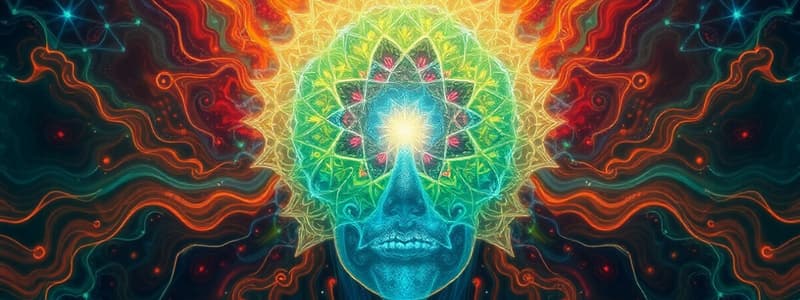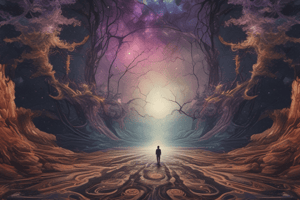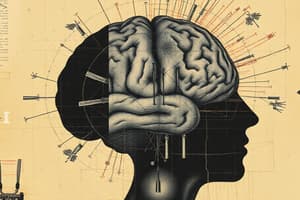Podcast
Questions and Answers
What best describes conscious processing?
What best describes conscious processing?
- Unaware and unconscious
- Limited capacity and slow sequenced processing (correct)
- Automatic and abstract
- Fast and parallel in nature
Which of the following states of consciousness is characterized by the highest level of alertness?
Which of the following states of consciousness is characterized by the highest level of alertness?
- Waking consciousness
- REM sleep
- High alertness
- Manic alertness (correct)
What is the primary feature of selective attention?
What is the primary feature of selective attention?
- Being aware of stimuli through unconscious processing
- Processing only the information we are consciously aware of (correct)
- The ability to be aware of all sensory information
- Noticing changes in our environment
How is change blindness best defined?
How is change blindness best defined?
Which of these options is NOT considered an altered state of consciousness?
Which of these options is NOT considered an altered state of consciousness?
What best characterizes nonconscious processes?
What best characterizes nonconscious processes?
Which concept describes the rhythmic biological fluctuations that occur in a 24-hour cycle?
Which concept describes the rhythmic biological fluctuations that occur in a 24-hour cycle?
What distinguishes unconscious processing from conscious processing?
What distinguishes unconscious processing from conscious processing?
What is one of the chronic effects of heroin use?
What is one of the chronic effects of heroin use?
Which effect is characteristic of depressants?
Which effect is characteristic of depressants?
What is a possible chronic effect of marijuana heavily used during adolescence?
What is a possible chronic effect of marijuana heavily used during adolescence?
How does ecstasy affect serotonin levels in the brain?
How does ecstasy affect serotonin levels in the brain?
Which statement about LSD is accurate?
Which statement about LSD is accurate?
What role do psychological factors play in drug use?
What role do psychological factors play in drug use?
What can contribute to a higher likelihood of teenage drug use?
What can contribute to a higher likelihood of teenage drug use?
What is the concept of dualism?
What is the concept of dualism?
Which phenomenon is closely associated with near-death experiences?
Which phenomenon is closely associated with near-death experiences?
What is a common expectation effect associated with drug use?
What is a common expectation effect associated with drug use?
Which of the following is a sign of being a morning lark?
Which of the following is a sign of being a morning lark?
What percentage of the population suffers from chronic insomnia?
What percentage of the population suffers from chronic insomnia?
During which stage of sleep does REM occur?
During which stage of sleep does REM occur?
What is a characteristic of Stage 2 sleep?
What is a characteristic of Stage 2 sleep?
What effect does caffeine have in the short term?
What effect does caffeine have in the short term?
What is the primary purpose of sleep from an evolutionary perspective?
What is the primary purpose of sleep from an evolutionary perspective?
Which sleep disorder involves the stopping of breathing during sleep?
Which sleep disorder involves the stopping of breathing during sleep?
What is NOT a symptom of acute caffeine consumption?
What is NOT a symptom of acute caffeine consumption?
What characterizes paradoxical sleep?
What characterizes paradoxical sleep?
What is a common effect of chronic sleep deprivation?
What is a common effect of chronic sleep deprivation?
Which neurotransmitter is primarily associated with sleep regulation?
Which neurotransmitter is primarily associated with sleep regulation?
Which lifestyle choice is typically associated with night owls?
Which lifestyle choice is typically associated with night owls?
Which statement accurately describes Stage 1 of sleep?
Which statement accurately describes Stage 1 of sleep?
What happens to the production of melatonin when light is present?
What happens to the production of melatonin when light is present?
Flashcards
Consciousness
Consciousness
The awareness of ourselves and our surroundings.
Conscious Processing
Conscious Processing
The processing of information in a slow, sequential manner, often involving active problem-solving.
Unconscious Processing
Unconscious Processing
The processing of information unconsciously, quickly, and simultaneously, often in parallel across multiple tasks.
Altered States of Consciousness
Altered States of Consciousness
Signup and view all the flashcards
Change Blindness
Change Blindness
Signup and view all the flashcards
Biological Rhythms
Biological Rhythms
Signup and view all the flashcards
Circadian Rhythm
Circadian Rhythm
Signup and view all the flashcards
Selective Attention
Selective Attention
Signup and view all the flashcards
What are depressants?
What are depressants?
Signup and view all the flashcards
What are Stimulants?
What are Stimulants?
Signup and view all the flashcards
What are Hallucinogens?
What are Hallucinogens?
Signup and view all the flashcards
What is THC?
What is THC?
Signup and view all the flashcards
What is Ecstasy known for?
What is Ecstasy known for?
Signup and view all the flashcards
What is LSD known for?
What is LSD known for?
Signup and view all the flashcards
What is Dualism?
What is Dualism?
Signup and view all the flashcards
What is Monism?
What is Monism?
Signup and view all the flashcards
What is Hypnosis known for?
What is Hypnosis known for?
Signup and view all the flashcards
What is the Biopsychosocial Model of Drug Use?
What is the Biopsychosocial Model of Drug Use?
Signup and view all the flashcards
Sleep
Sleep
Signup and view all the flashcards
REM Sleep
REM Sleep
Signup and view all the flashcards
Stage 4 Sleep
Stage 4 Sleep
Signup and view all the flashcards
Night Terrors
Night Terrors
Signup and view all the flashcards
Insomnia
Insomnia
Signup and view all the flashcards
Sleep Apnea
Sleep Apnea
Signup and view all the flashcards
Caffeine
Caffeine
Signup and view all the flashcards
Nicotine
Nicotine
Signup and view all the flashcards
Depressants
Depressants
Signup and view all the flashcards
Barbiturates
Barbiturates
Signup and view all the flashcards
Alcohol
Alcohol
Signup and view all the flashcards
Dopamine
Dopamine
Signup and view all the flashcards
Sleep Deprivation
Sleep Deprivation
Signup and view all the flashcards
Study Notes
Consciousness
- Consciousness is our awareness of ourselves and our environment.
- Dual processing occurs in the brain where information is processed simultaneously on conscious and unconscious tasks.
- Conscious processing is slow, sequential, and has limited capacity; good at problem-solving.
- Unconscious processing is fast, parallel, and not the same as Freud's unconscious.
- Both processes happen simultaneously.
Altered States of Consciousness
- Consciousness exists on a scale of alertness, ranging from manic alertness to coma.
- States include waking consciousness, drowsiness, daydreaming, REM and non-REM sleep, coma/vegetative state, and more.
- Many altered states, such as sensory deprivation, hypnosis, meditation, starvation, and drowsiness exist.
Conscious/Awake Levels
- Consciousness involves sensory and inner awareness and a sense of self.
- Conscious processing is serial (sequential).
- Preconscious processing is not currently aware, but is accessible.
- Unconscious processing is unavailable under most conditions.
- Nonconscious processing involves basic biological functions.
Selective Attention
- Our conscious awareness focuses on a small portion of experience.
- We utilize information outside of conscious awareness.
- Inattentional blindness occurs when we fail to notice something obvious.
- Change blindness is a type of inattentional blindness, where we don't notice changes in our environment.
Sleep
- Biological rhythms are periodic physiological fluctuations controlled by a biological clock.
- Circadian rhythm is a 24-hour bodily rhythm.
- Morning larks are productive in the morning, while night owls excel at night.
- Natural 24-hour-11-minute circadian rhythm, with light influencing melatonin production, can be disrupted by sleep schedule adjustments.
Sleep Stages
- Sleep is a periodic, natural, and reversible loss of consciousness.
- A 90-minute cycle has 5 stages (1-4 and REM).
- Stage 1: Irregular brain waves, slowed breathing, sleep talking, and hypnagogic hallucinations. A myoclonic jerk is a sudden muscle contraction.
- Stage 2: Sleep spindles & K-complexes appear; brain inhibits mental processes.
- Stage 3: Transition stage, producing delta waves.
- Stage 4: Deep sleep (delta waves), hard to awaken; sleepwalking, bedwetting, and night terrors possible.
- REM sleep: Dreaming occurs, rapid eye movement is common, paradoxical sleep (paralysis), faster heart rate and breathing.
Why We Sleep
- Sleep likely provides evolutionary protection from danger & recuperation for body and brain. During sleep:
- Important memories are reinforced and unimportant memories are shed.
- Bodily growth, specifically growth hormone secretion during stage 4, occurs mostly during sleep
Sleep Deprivation
- Acute sleep deprivation causes irritability, decreased alertness, and reduced activity.
- Chronic sleep deprivation impacts immune function, leading to depression, obesity, and hypertension.
Sleep Disorders
- Insomnia: Difficulty falling asleep or staying asleep (acute and chronic).
- Sleep apnea: Cessation of breathing during sleep (obstructive & central).
- Night terrors: Frightening episodes during stage 4 sleep; not nightmares.
Drugs
- Depressants: Slow messages between brain & body; low oxygen in the body
- Alcohol: slows motor & cognitive function plus decreases inhibition
- Barbiturates: reduced motor control, dizziness, reduced REM sleep
- Stimulants: Create fake messages telling the body it's stressed. Leads to:
- Increased heart & breathing rates, constricted blood vessels, decrease in body cool down capabilities, and less energy
- Hallucinogens: Distort perceptions and create hallucinations.
- Marijuana: Relaxation, euphoria, impaired memory/reactions, hallucinations; long-term use can impede brain development
- Ecstasy: Hypersensitivity, affection, confusion; long-term brain damage, kidney/cardiovascular problems
- LSD: Dilated pupils, high/low body temp., hallucinations; permanent damage to serotonin receptors.
Effects of Expectations:
- Placebo effects from drugs are substantial,
- Our beliefs about drugs often impact our experience with them.
Drug Use Overview:
- Drug use is a biopsychosocial phenomenon influenced by biological factors (genetics, dopamine), psychological factors (stress, purpose), and social/cultural influences.
Near Death Experiences
- Altered states of consciousness reported after close brush with death; sometimes similar to drug-induced hallucinations. May include: replayed memories, out-of-body sensations, bright lights/tunnels.
Dualism & Monism
- Dualism: Mind and body are separate.
- Monism: Mind and body are aspects of the same thing.
Hypnosis
- Hypnosis is a state of heightened suggestibility.
- About 20% of the population is highly sensitive to hypnosis.
- Hypnosis won't make you do something you wouldn't normally do.
Studying That Suits You
Use AI to generate personalized quizzes and flashcards to suit your learning preferences.




